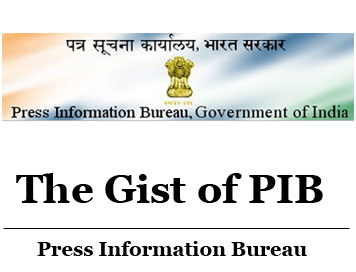(The Gist of PIB) Cabinet approves proposal for Constitution of Development and Welfare Board for Denotified, Nomadic and Semi-Nomadic Communities [MARCH-2019]
(The Gist of PIB) Cabinet approves proposal for Constitution of Development and Welfare Board for Denotified, Nomadic and Semi-Nomadic Communities [MARCH-2019]
Cabinet approves proposal for Constitution of Development and Welfare Board for Denotified, Nomadic and Semi-Nomadic Communities
- The Union Cabinet has given its approval for constitution of Development and Welfare Board for Denotified, Nomadic and Seminomadic Communities (DNCs).
Who are they?
- Amongst the most disadvantaged communities in the country are the Denotified, Nomadic and SemiNomadic Communities (DNCs).
- These communities are hard to reach, less visible, and therefore frequently left out.
- While most DNTs are spread across the Scheduled Castes (SC), Scheduled Tribes (ST) and Other Backward Classes (OBC) categories, some DNTs are not covered in any of the SC. ST or OBC categories.
Need for protection:
- Denotified, Nomadic and SemiNomadic Communities are considered to be the most deprived sections of Indian society.
- The nomadic and semi-nomadic communities move from place to place in search of livelihood.
- As a result, they are frequently left out. Hence to address the issues related to these communities there is a need for special attention.
Challenges faced by them:
- The Denotified Tribes are communities that were listed or notified as ‘born criminal ‘by the British under a number of laws.
- The term, ‘Denotified and Nomadic Tribes’, can be traced to the Criminal Tribes Act (CTA) of 1871.
- The colonial government notified nearly 200 tribal communities to be hereditary criminals, cementing their societal identity as outcasts and subjecting them to constant harassment by the administration.
- Forest laws that came into force from the mid-nineteenth century onwards deprived a large number of communities of their traditional rights of hunting and gathering. The new laws criminalised their very source of livelihood when it practiced.
- When the forests were cleared by the British for commercial use and forest communities asked to contribute to labour, some communities resisted and were declared ‘criminal’.
- The British thought that communities had lost their legitimate means of livelihood, they must have been living by indulging in criminal activities due to arrival of road and railway networks. After India gained Independence, these tribes were ‘de-notified’ from the list of Criminal Tribes.
Study Material for UPSC General Studies Pre Cum Mains
This is Only Sample Material, To Get Full Materials Buy The Gist 1 Year Subscription - "Only PDF" Click Here
Click Here to Download More Free Sample Material
<<Go Back To Main Page
Courtesy: PIB


